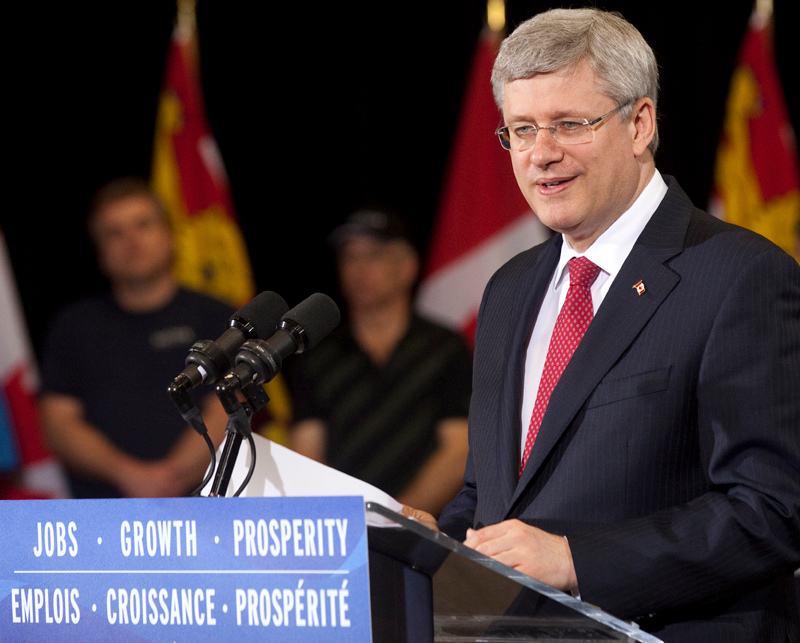In early 2014 the Harper government expected a $6.4-billion budget surplus in 2015-16. And so, with the October 19, 2015 election on the horizon, the Conservatives implemented income-splitting this past fall. That came with a price tag of about $3 billion or more a year.
The Toronto Star has reported, “Under this measure, [a] couple could lower combined income taxes by shifting up to $50,000 of taxable income to the spouse in the lower income tax bracket. [Critics say] the bulk of the benefits would go to high-income earners while most Canadians would benefit not at all. Even former finance minister Jim Flaherty questioned its fairness. [The NDP says] income-splitting provisions would do nothing for single parents or parents with similar incomes. [And a study by the right-wing] C.D. Howe Institute concluded that 80 per cent of families would see no benefits from income-splitting.”
Income-splitting and other measures also meant the projected surplus of $6.4 billion for 2015-16 would be a $1.9-billion surplus instead.
Enter falling oil prices. While cheaper gas means Canadian motorists could save $12 billion in 2015, it has other implications for the Harper government given its chosen dependence on a petro-economy. TD now forecasts an average price of oil at $67 a barrel in 2015. That would mean a $2.3-billion federal deficit in 2015-16 and a $600-million deficit in 2016-17. In a more dire projection, Goldman Sachs says the price of oil will average at $47.16 per barrel. That would mean a $4.7-billion deficit in 2015-16 and a $2.4-billion deficit in 2016-17.
The Harper government’s response?
First, Finance Minister Joe Oliver announced last week that he would delay introducing the federal budget until at least April. NDP finance critic Nathan Cullen has characterized this as, “That’s somebody hiding under the covers and hoping bad things will just go away.”
And now Minister of Employment and Social Development Jason Kenney and Treasury Board President Tony Clement have suggested (even more) federal spending cuts could be on the horizon. Kenney says, “We’ll have to calibrate whether additional restraint is necessary on the spending side but this is why it’s important for us to keep taxes down and to focus on economic growth.” And Clement says, “We believe that we can get that balanced budget. It does mean that some of our other spending promises have to be looked at again… the flexibility has been removed but it’s quite possible to get to a balanced budget.”
Where do the other parties stand on income-splitting?
Metro News reports, “The NDP [opposes income-splitting and now] Mulcair has confirmed his party would reverse it if they came to power, including the policy nugget in a speech meant to rally the troops and position his party as the champion of middle-class voters. Liberal Leader Justin Trudeau, who has made an appeal to middle-class voters a major theme of his tenure as leader, has also promised to reverse the income-splitting plan.” Green Party leader Elizabeth May has tweeted, “Income splitting leaves out most ppl. Single parents, low-income families, all couples without kids, or with older kids — all left out.”
The Broadbent Institute says, “If the Harper government really wanted to expand choices for families with young children in a fair way, it could improve maternity and parental benefits under employment insurance. This program allows for up to one year’s paid leave from work, but benefits are so small — on average, just over $400 per week — that many families have to cut the leave short. Alternatively, the government could increase child benefits for lower-income families so that families choosing to work fewer hours, and thus to earn less, get more support through higher child tax credits. The $3 billion that income-splitting will drain from federal coffers would be enough to increase federal spending on child tax credits by more than 25 per cent. Or to double current spending on maternity and parental leave benefits. Or to make a significant contribution toward enhanced access to quality child-care programs.”
What does the most recent poll say about the October 19 election?
An Ipsos Reid poll released on Thursday shows the Conservatives at 35 per cent (up 2 points since December), the Liberals at 31 per cent (down 3 points), the NDP at 24 per cent (unchanged), the Green Party at 4 per cent, and the Bloc Quebecois at 25 per cent support in Quebec. Ipsos Reid senior vice-president John Wright says this puts the Conservatives close to majority government territory. This is in part, as the Huffington Post explains, because, “Last year, Elections Canada took the 2011 election results and redistributed the votes over the [map with the 30 new ridings] that will be used this year. The agency found Tories would have won 22 more seats in the last election had those boundaries existed.”
To read about the Council of Canadians election campaign, please click here.
Photo: pmwebphotos/flickr



